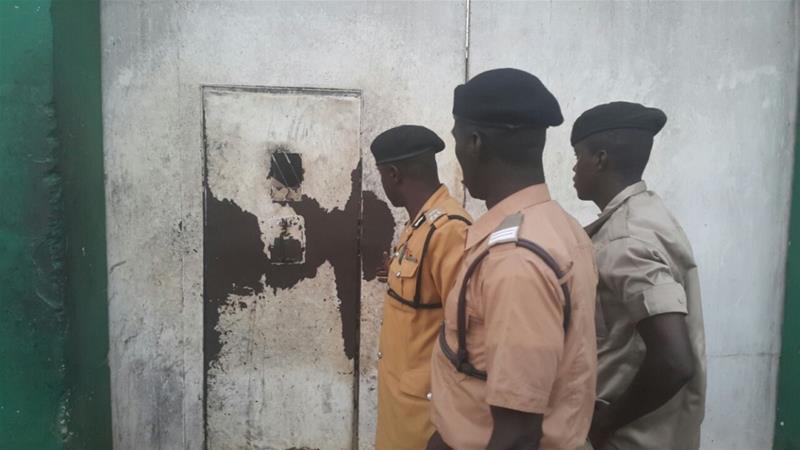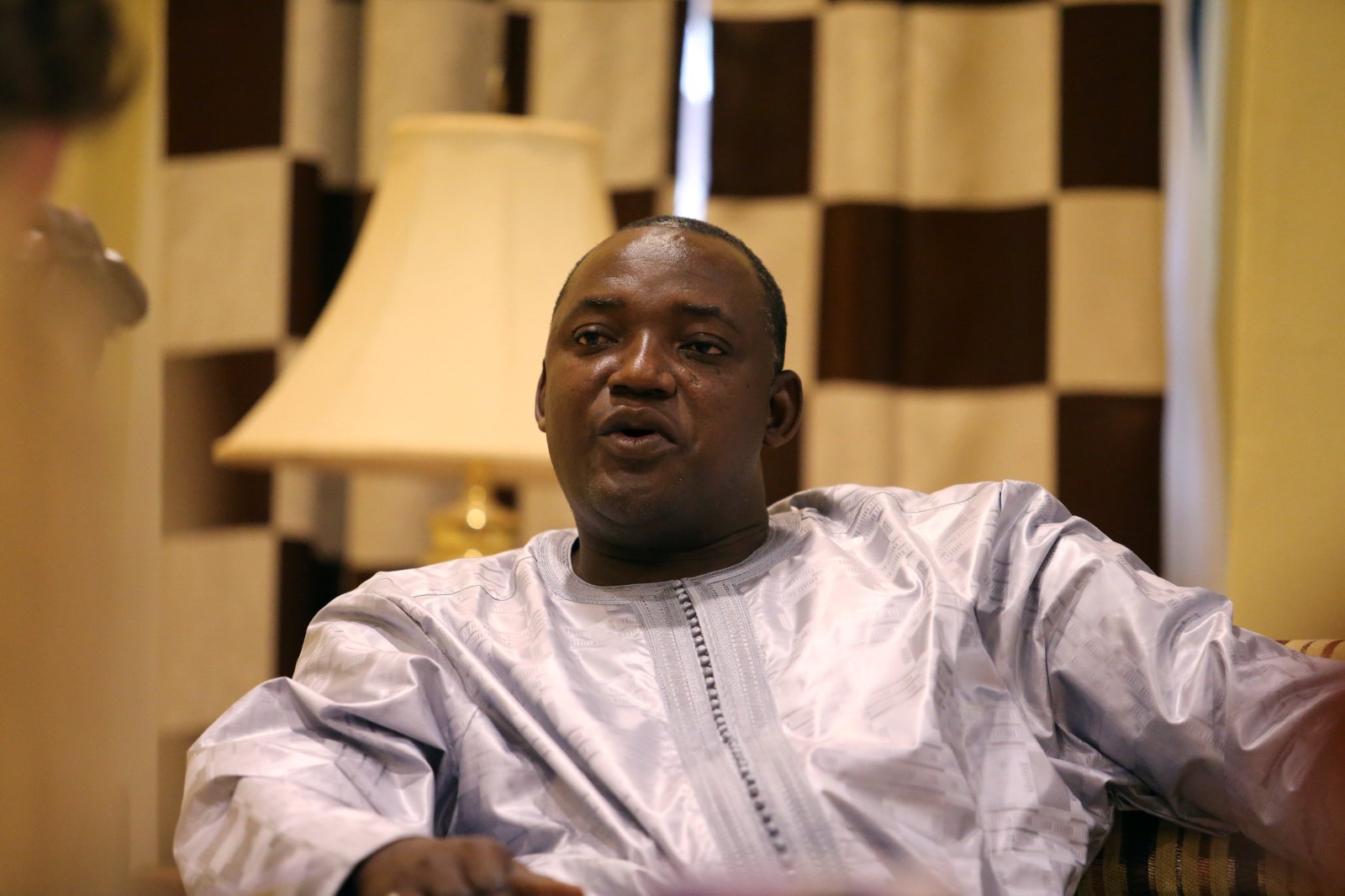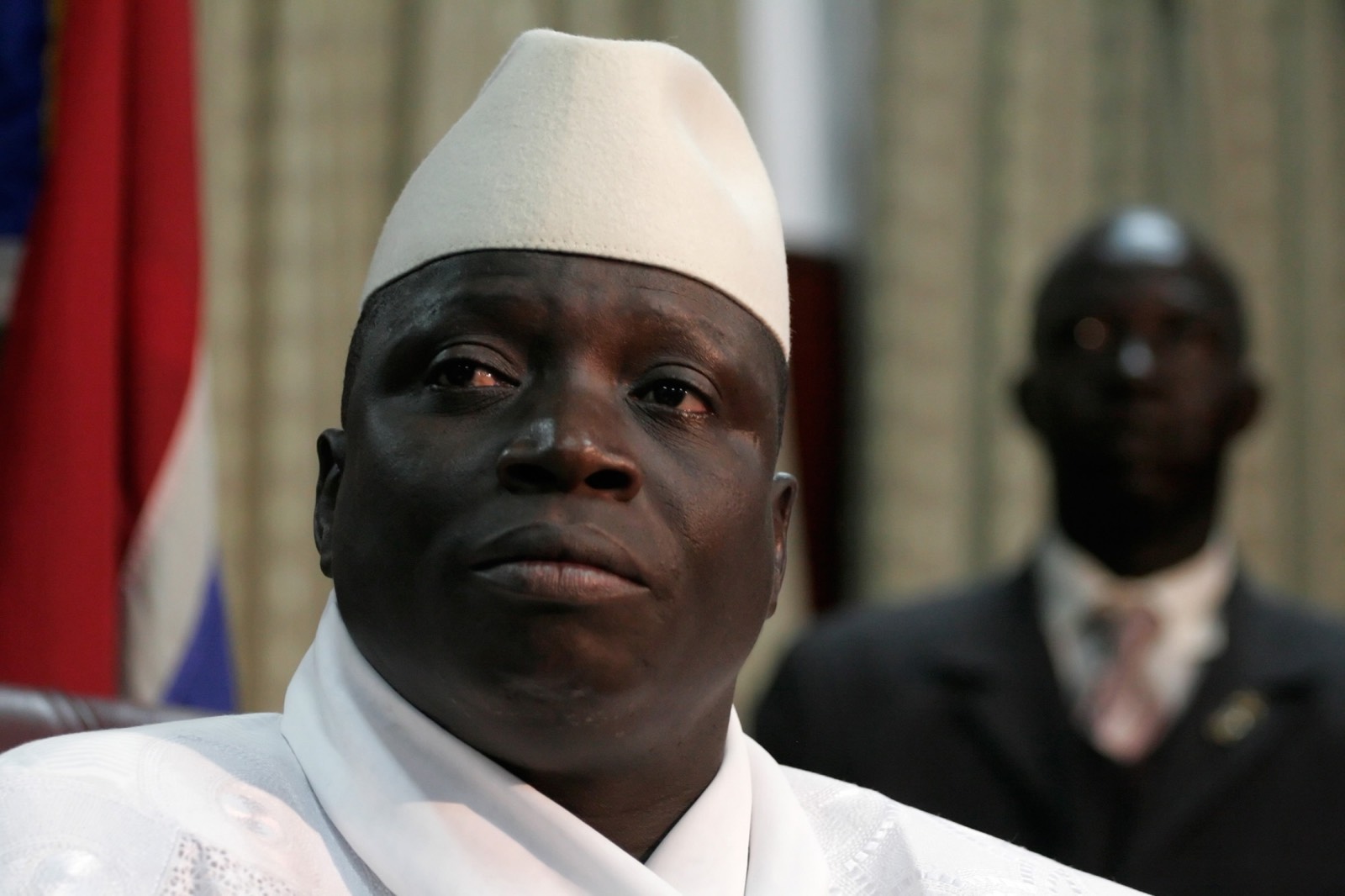The walls were once painted white. And, in its past life, the floor was a layer of smooth cement. But the walls have turned brown now, covered in dust and sweat, and the cement has started to crumble into potholes and cracks.
This is the notorious Mile 2 Prison outside the Gambian capital Banjul.
Just the mention of that name was once enough to inspire fear in those who did not tow the government line in this tiny West African country.
It was where the political prisoners of former president Yahya Jammeh, who ruled The Gambia for more than two decades, since leading a military coup in 1994, were sent.
Some endured years of torture before being released. And those were the fortunate ones; others were never seen again.
‘They filmed everything they did to me’
About a 40-minute drive from the colonial era prison is the home of politician Nokoi Njie. As the late afternoon sun disappears behind the palm and mango trees, her children and relatives gather around her to listen to stories of what life was like behind the prison’s bars.

“I still remember the day the security services picked me up. It was April 14, 2016, and we were protesting for electoral reform,” she says, her breathes deep as she tries to hold back her tears.
“The beating and torture started as soon as they put us in the lorry that was to take us into custody. We were arrested by big paramilitary men.”
She was not alone. Dozens of activists and politicians were picked up that day. It wasn’t the first time Njie had fallen foul of the authorities – but it would be the worst.
“It was my second time,” she explains. “In 2011, before the election, I was arrested because I opposed the president’s people registering non-Gambians to vote in our election.”
On that occasion she was released after a day. But things would be different this time; she would spend months behind bars without any contact with her family or a lawyer.
“When they put me in a cell, they tied my legs with a wire rope which cut deep into my flesh and I was bleeding.
They then beat me with a baton and a rubber whip made from car tyre. They filmed everything they did to me. It was so bad I started saying my final prayers,” she says, the tears now running down her cheeks.
“For three months my family did not see me or hear from me. They thought I was dead.”
‘They beat him non-stop’
But Njie was lucky. Some of those arrested with her that day did not leave the torture chambers alive.
Solo Sandeng was one of them. The opposition activist had, like Njie, been protesting for reform when he was arrested. Not many people know what happened to him, but Njie does.
“We were in the same cell,” she says, her voice cracking with emotion. “They beat him non-stop in front of my eyes until he could not move a finger. He was motionless but that did not stop them.”
Wiping away her tears with trembling hands, Njie continues: “They then poured cold water on him to try and make him move.
They then started beating him again. Solo then made one small grunt and that was it. He was dead.”
Fifty-seven-year-old Sandeng left behind nine children – and they say they want answers about what happened to their father.
“We want justice and we want those behind his death to be brought to court,” explains one of his daughters, Fatima Sandeng, in the family home about an hour outside Banjul.
Then, Fatima, who is also an activist, adds defiantly: “Before any reconciliation can happen in our country those who committed these crimes need to face the law. Justice before reconciliation.”
Two days after Fatima spoke to Al Jazeera, police found the unmarked grave where her father’s body had been buried.
The former director of operations at the notorious National Intelligence Agency (NIA), Saikou Omar Jeng, led police to a grave in Tanje, a small fishing village around 33km from the capital.
Waiting to die
It wasn’t only activists and politicians who bore the brunt of Jammeh’s rule. Anyone who stood in the way of those connected to the seat of power could find themselves imprisoned.
Twenty kilometres south of the prison, in a two-bedroom house in the town of Brikama, Musa Jobe still can’t believe that he is a free man.
The former tax collector was arrested in 2011 after he upset a group of well-connected businessmen. They accused him of issuing vehicle licences illegally.
He spent three years and 11 months behind bars in Mile 2. He thought he would die there, he says, shaking his head.
“Two to three people were dying a day of sickness and maltreatment while I was there.”
“The court dropped all the charges [against me] because they had no evidence,” he says. “But they still kept me in prison.”
Jobe says he was simply waiting for death.
“I was kept in a cell with 30 other people. We had no bathroom and had to relief ourselves in a tin on the corner of the room.”
The slow but firm ‘wheels of justice’
But The Gambia is changing. Jammeh is no longer in power after losing December’s poll.
He lost last December’s elections and, after refusing to leave office, was forced into exile in January by forces from the regional bloc ECOWAS.

Adama Barrow was sworn in as the country’s new president. One of the first things he did was release the political prisoners and those who had been held without trial. Njie and Jobe were among them.
The new government also arrested the former head of the country’s national intelligence agency, Yankuba Badjie, and his deputy Saikou Omar Jeng.
Both were accused of overseeing killings, kidnappings, arbitrary arrests, torture and rape during their time in office.
The new government has also promised to leave no stone unturned when it comes to investigating the abuses that occurred under Jammeh.
“We have released all political detainees and political prisoners in The Gambia,” explains Mai Ahmad Fatty, the country’s new interior minister a day after President Barrow ordered the release of more than 90 prisoners from Mile 2 Prison.
“Today as we speak we don’t have any political prisoners or detainees in our country. They were incarcerated on account of their opinion or beliefs. They had no business being in prison so we released them all.”
The interior minister says that he wants Gambians to be patient as the new government tries to reform the country’s justice system.
“The wheel of justices grinds really slowly but firmly. The government is investigating all allegations of human right abuses and we have apprehended some people who have been accused and they will appear before court,” he tells Al Jazeera.
“But the exercise is not complete and we are looking at persons of interests who are alleged to have been involved in these illegal practices and we will not rest until justice is served. Some suspects might be out of the country and we will use the international criminal justice processes to reach them.”
Njie says she is happy that Jammeh is no longer running the country and that she finally has a government she believes in.
“The new government is doing well,” she reflects as one of her grandchildren looks on from the corner of the living room.
“And we can vote them out if they don’t do as we want them to. Our main problem was Jammeh. Now that he is gone we are happy.”
This article was originally published on Aljazeera.







